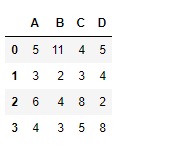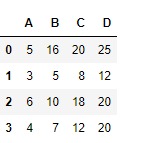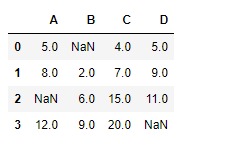Python是进行数据分析的一种出色语言,主要是因为以数据为中心的python软件包具有奇妙的生态系统。 Pandas是其中的一种,使导入和分析数据更加容易。
Pandas dataframe.cumsum()用于查找任何轴上的累加总和值。每个单元格都填充了到目前为止看到的值的累积和。
用法: DataFrame.cumsum(axis=None, skipna=True, *args, **kwargs)
参数:
axis:{索引(0),列(1)}
skipna:排除NA /空值。如果整个行/列均为NA,则结果为NA
返回:cumsum:系列
范例1:采用cumsum()函数沿索引轴查找值的累积和。
# importing pandas as pd
import pandas as pd
# Creating the dataframe
df = pd.DataFrame({"A":[5, 3, 6, 4],
"B":[11, 2, 4, 3],
"C":[4, 3, 8, 5],
"D":[5, 4, 2, 8]})
# Print the dataframe
df输出:

现在找到索引轴上值的累积和
# To find the cumulative sum
df.cumsum(axis = 0)输出:

范例2:采用cumsum()函数以查找到目前为止沿列轴看到的值的累积和。
# importing pandas as pd
import pandas as pd
# Creating the dataframe
df = pd.DataFrame({"A":[5, 3, 6, 4],
"B":[11, 2, 4, 3],
"C":[4, 3, 8, 5],
"D":[5, 4, 2, 8]})
# To find the cumulative sum along column axis
df.cumsum(axis = 1)输出:

范例3:采用cumsum()函数查找迄今在数据帧中沿索引轴看到的值的累积和NaN DataFrame 中存在的值。
# importing pandas as pd
import pandas as pd
# Creating the dataframe
df = pd.DataFrame({"A":[5, 3, None, 4],
"B":[None, 2, 4, 3],
"C":[4, 3, 8, 5],
"D":[5, 4, 2, None]})
# To find the cumulative sum
df.cumsum(axis = 0, skipna = True)输出:

输出是一个数据帧,其中的单元格包含到目前为止沿索引轴看到的值的累积和。任何Nan DataFrame 中的值将被跳过。
相关用法
- Python pandas.map()用法及代码示例
- Python Pandas Series.str.len()用法及代码示例
- Python Pandas.factorize()用法及代码示例
- Python Pandas TimedeltaIndex.name用法及代码示例
- Python Pandas dataframe.ne()用法及代码示例
- Python Pandas Series.between()用法及代码示例
- Python Pandas DataFrame.where()用法及代码示例
- Python Pandas Series.add()用法及代码示例
- Python Pandas.pivot_table()用法及代码示例
- Python Pandas Series.mod()用法及代码示例
- Python Pandas Dataframe.at[ ]用法及代码示例
- Python Pandas Dataframe.iat[ ]用法及代码示例
- Python Pandas.pivot()用法及代码示例
- Python Pandas dataframe.mul()用法及代码示例
- Python Pandas.melt()用法及代码示例
注:本文由纯净天空筛选整理自Shubham__Ranjan大神的英文原创作品 Python | Pandas dataframe.cumsum()。非经特殊声明,原始代码版权归原作者所有,本译文未经允许或授权,请勿转载或复制。
